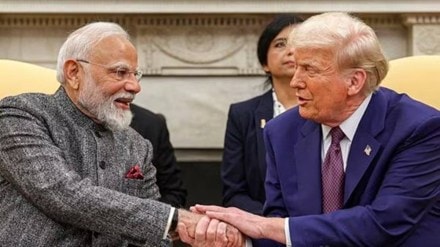White House Press Secretary Karoline Leavitt, who described India as a “strategic ally” in the Indo-Pacific region, confirmed that the India-US deal is on the table and that the two countries are very close to finalising a trade deal.
“Yes, the President said last week (that the US and India are very close to a trade deal), and it remains true,” Leavitt said during a press briefing.
She added, “I just spoke to our Secretary of Commerce about it. He was in the Oval Office with the President. They are finalising these agreements, and you’ll hear from the President and his trade team very soon when it comes to India.”
She also addressed a question about China’s role in the Indo-Pacific and emphasised the “very good relationship” that PM Modi and Trump share. “India remains a very strategic ally in the Asia Pacific, and the President has a very good relationship with Prime Minister Modi, and he will continue to have that.”
What has Trump said last week?
Trump, while speaking about his kind reciprocal tariffs, said that the US is aiming to reach a “great deal” with India, stressing that this would require a “full trade barrier dropping”.
“We’re having some great deals. We have one coming up, maybe with India, a very big one…,” he said, hinting at a long-awaited bilateral trade agreement between the two countries.
“India, I think we are going to reach a deal where we have the right to go and do trade. Right now, it’s restricted. You can’t walk in there, you can’t even think about it,” Trump said.
He added, “We are looking to get a full trade barrier dropping, which is unthinkable, and I am not sure that that is going to happen. But as of this moment, we agree that going to India and trade….”
EAM Jaishankar is in US
The timing of her remarks is important as External Affairs Minister S Jaishankar is in the United States to attend the QUAD Foreign Ministers’ Meeting. QUAD – a group of four nations – was formed to coordinate humanitarian efforts following the 2004 Indian Ocean tsunami but has since evolved into a key strategic dialogue in the Indo-Pacific region. It consists of Australia, India, Japan, and the US.
The US President is set to attend the upcoming QUAD summit in New Delhi, Foreign Secretary Vikram Misri confirmed. “For the next meeting of QUAD, PM Modi invited President Trump to India. While accepting the invitation, President Trump said that he is excited to come to India,” he said.
As part of his US visit, Jaishankar inaugurated an exhibition on “The Human Cost of Terrorism”. He highlighted how terrorism is a grave threat to humanity and how it must be dealt with an iron fist, with the world coming together and standing against issues such as impunity to terrorists and not yielding to nuclear blackmail.
“Terrorism is one of the greatest threats to humanity. It is the antithesis of everything that the UN stands for, human rights, rules and norms, and how nations should conduct their dealings with each other. When terrorism is supported by a state against a neighbour, when it is fuelled by the bigotry of extremism, when it drives a whole host of illegal activities, it is imperative to call it out publicly. And one way of doing so is to display the havoc that it has wreaked on global society,” he said.
He then drew attention to the April 22 terror attack in Pahalgam, noting that it drew strong condemnation from the United Nations Security Council. “The world must come together on some basic concepts: no impunity to terrorists, no treating them as proxies, and no yielding to nuclear blackmail.”
India-US trade deal
India is looking forward to finalising the trade deal with the US before the July 9 deadline. The US has imposed reciprocal tariffs on imports from 57 countries, including India. It has imposed a 26% reciprocal tariff, which comprises a 10% duty that came into effect on April 5, and an additional 16% set to be levied from July 9.
The US wants duty concessions on certain industrial goods, automobiles – especially electric vehicles, wines, petrochemical products, dairy, and agricultural items like apples, tree nuts, and genetically modified crops. It also wants concessions on the agriculture and dairy sectors, which India finds challenging to give.
India is seeking duty concessions for labour-intensive sectors like textiles, gems and jewellery, leather goods, garments, plastics, chemicals, shrimp, oil seeds, grapes, and bananas in the proposed trade pact.
The two countries are looking to conclude talks for the first tranche of the proposed bilateral trade agreement (BTA) by September-October this year. The pact is aimed at more than doubling bilateral trade to USD 500 billion by 2030 from the current USD 191 billion.
